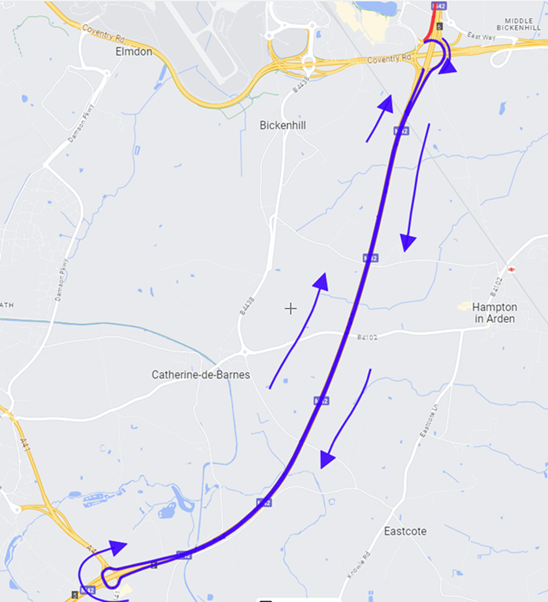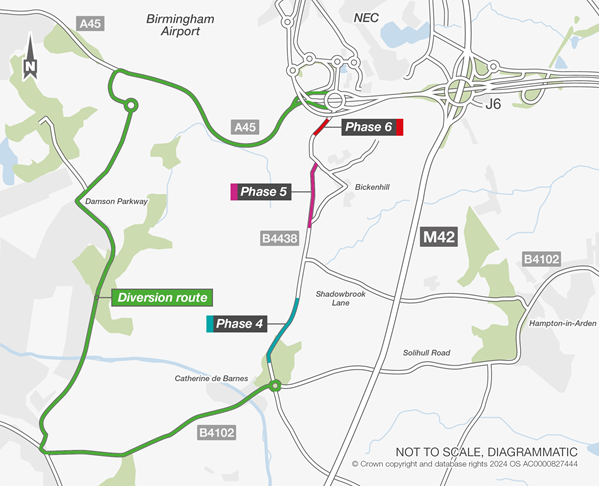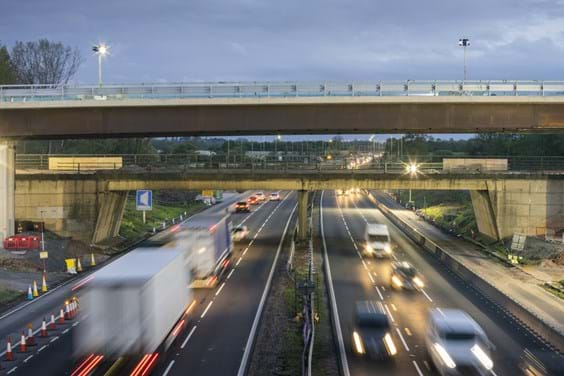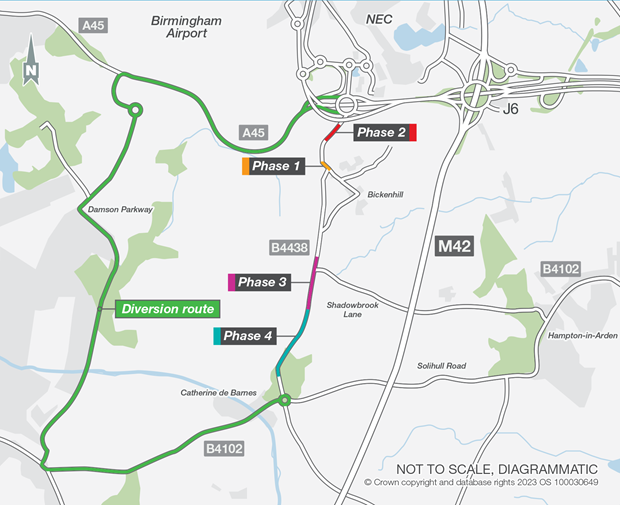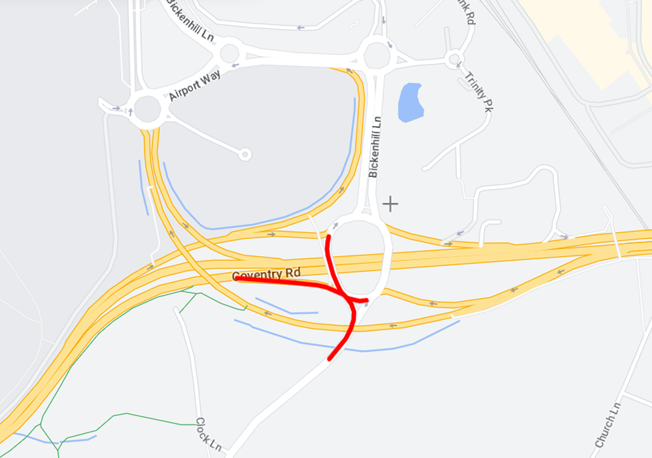M42 junction 6
We are making safety and capacity improvements to this important strategic route to support economic growth and planned development in the region.

The scheme - once complete - will alleviate heavy traffic around Junction 6 and the busy A45
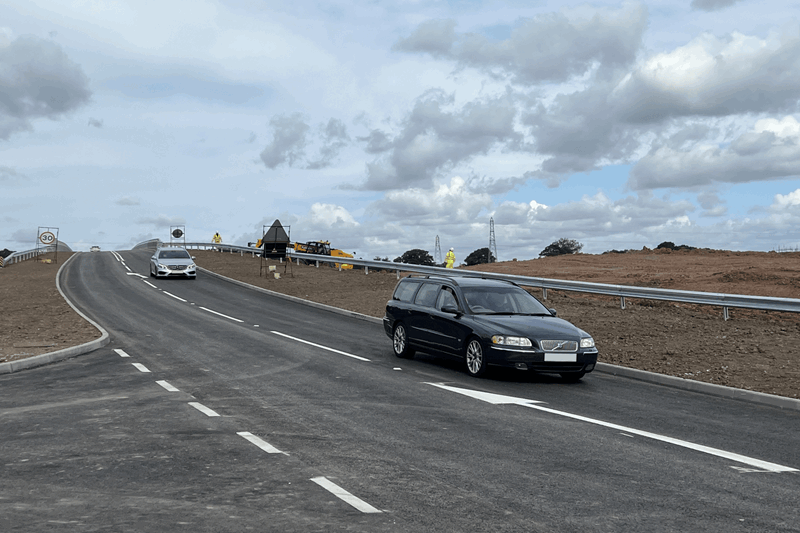
The new Solihull Road bridge which opened in June 2023
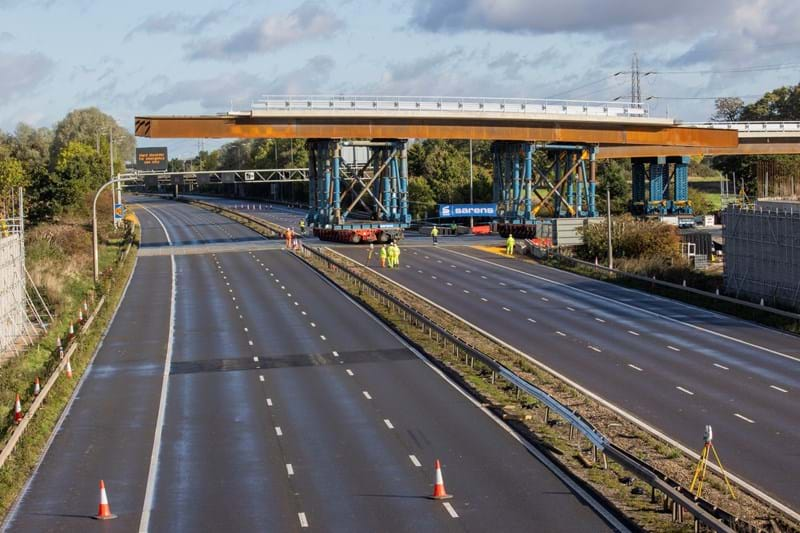
Solihull Road bridge being moved in to position

Work being carried out to build the new link road
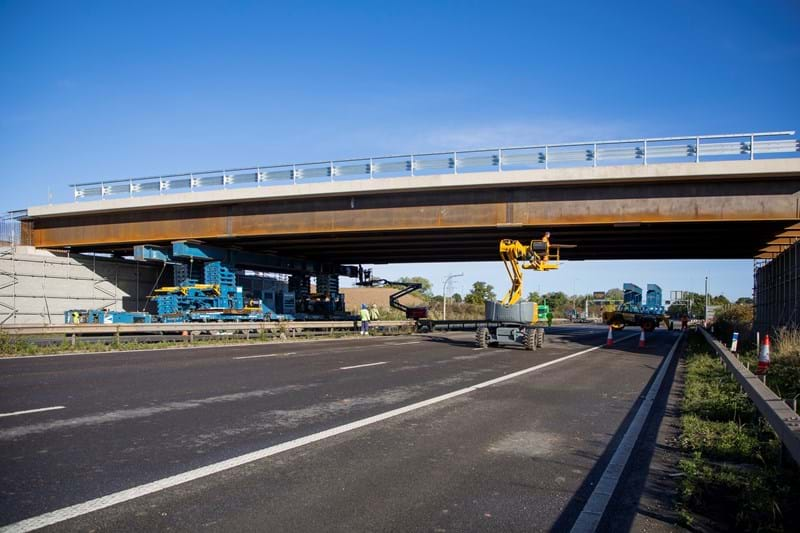
New junction 5a bridge being lifted into position
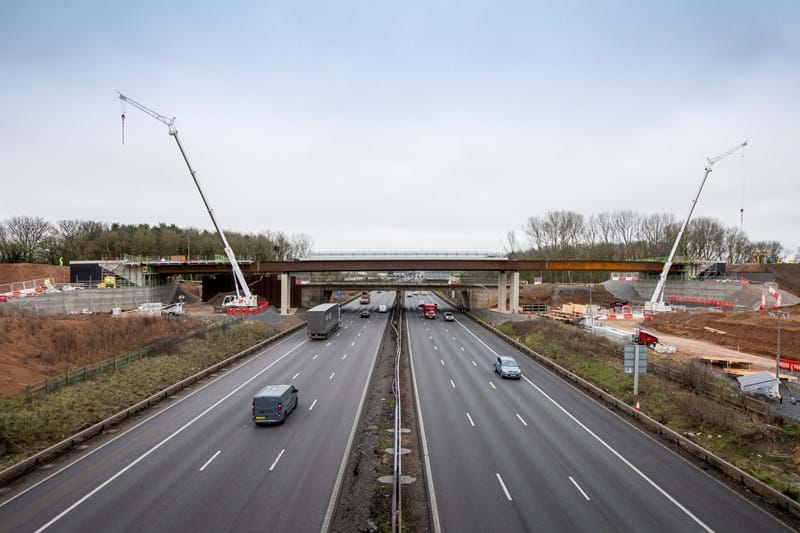
The location of junction 5a
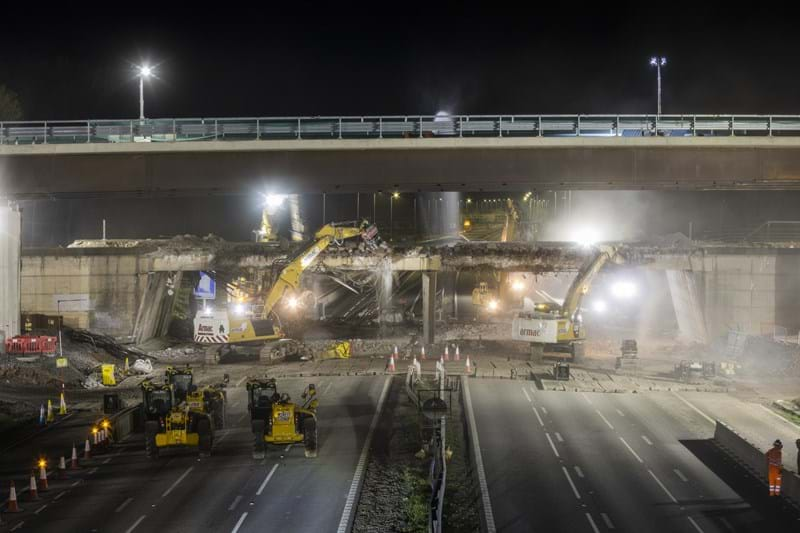
The old Solihull Road bridge being demolished
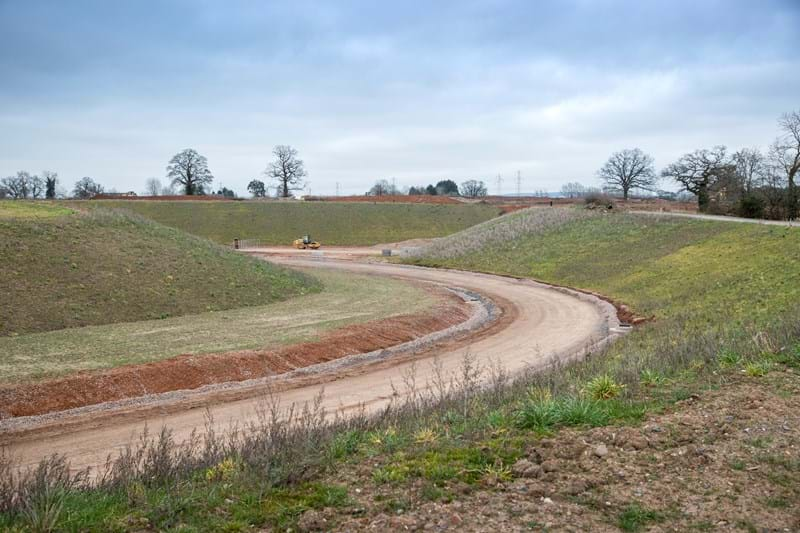
A4545 link road under construction
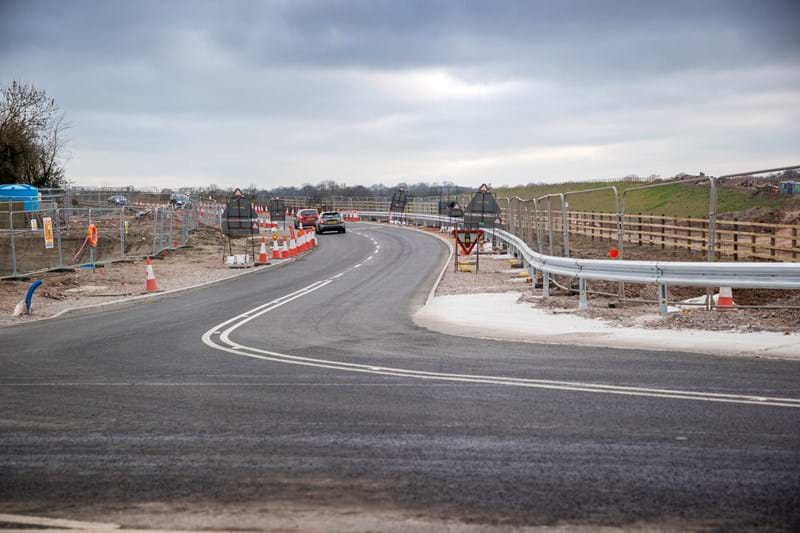
Catherine de Barnes Lane
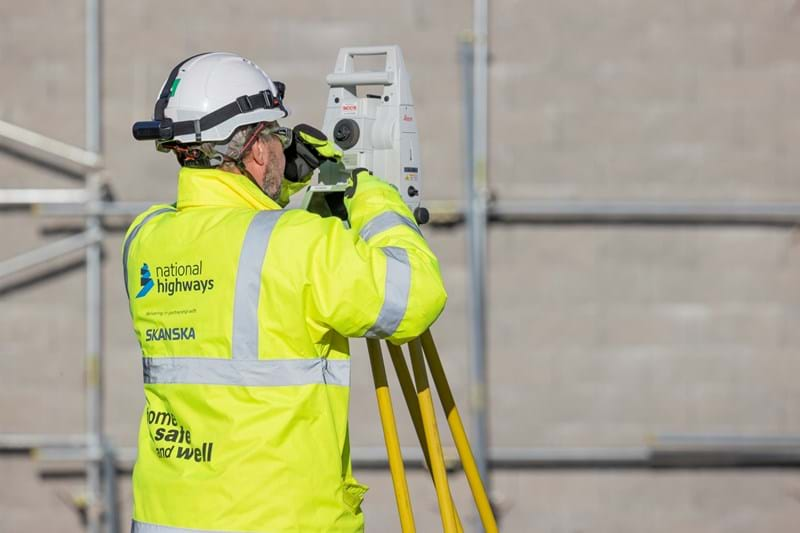
Survey work being carried out on site
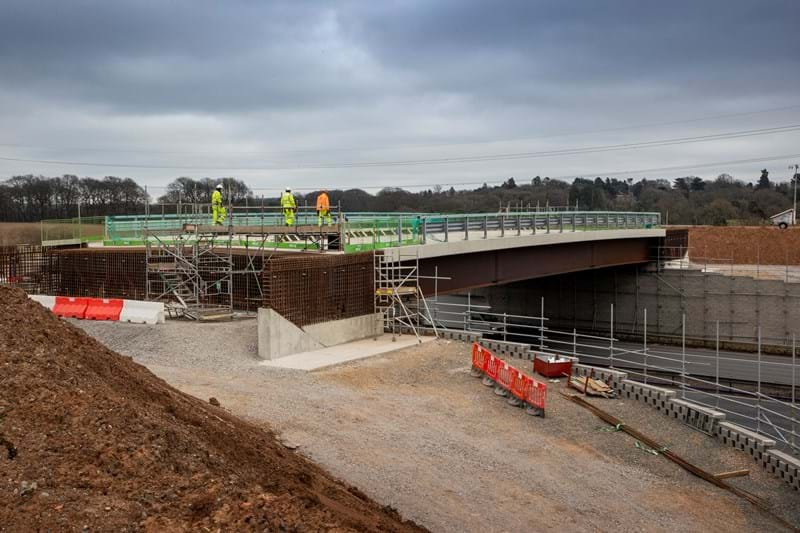
The new junction 5a overbridge now in position
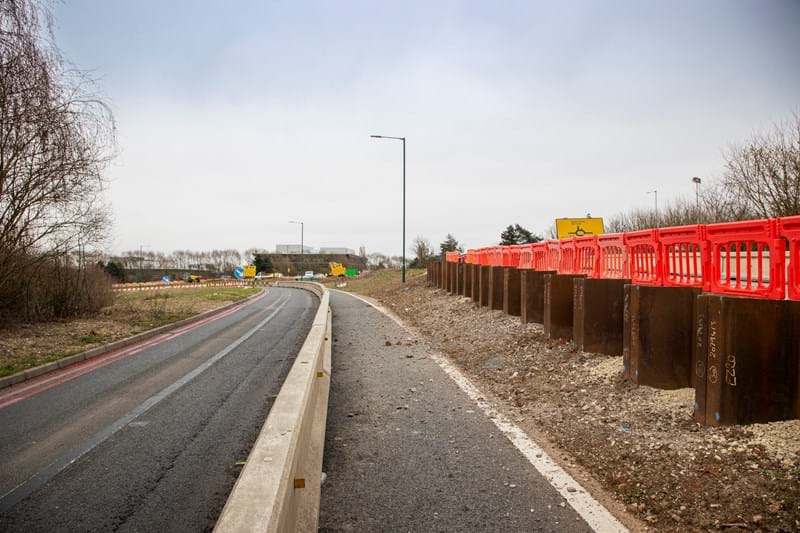
New slip roads under construction
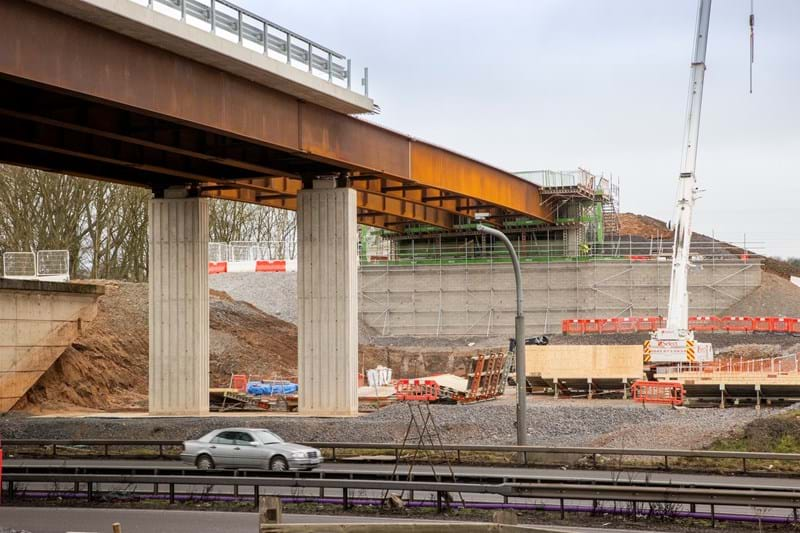
The new Solihull Road bridge, now in position over the M42
Latest updates
-
10 April 2024
Please check before you travel: upcoming M42 northbound closures
Following vegetation clearance during March, we’re now able to install new CCTV and National Roads Telecommunications Services (NRTS) infrastructure along the motorway. This work is part of our commitment to providing safer and smoother journeys along the M42 as we continue our upgrade at junction 6.
Traffic management
We’ll be carrying out this work on the northbound M42 carriageway, with lane 1 and 2 restrictions in place between junction 6 and 7 overnight on weeknights, between 9pm and 5am, from Monday 15 to Tuesday 23 April
The northbound M42 entry-slip at junction 6 will also be closed overnight on Monday 15, Tuesday 16, Monday 22 and Tuesday 23 April, from 9pm to 5am. During these closures, a clearly signed diversion route will be in place as shown on the image below. Traffic will be directed to join the southbound M42 at junction 6, exiting at junction 5 and rejoining the M42 northbound.
We apologise in advance for any inconvenience you may experience during the upcoming roadworks. The whole team will make every effort to manage noise levels carefully and minimise disruption to the local area.
How can we find out more?
If you’d like more information about this upgrade scheme you can contact us by:
- emailing M42Junction6@nationalhighways.co.uk
- calling 0300 123 5000 (this line is available 24 hours a day)
For the latest information about our scheme and upcoming roadworks you can also follow us on X (formerly Twitter) at @HighwaysWMIDS and find us on Facebook (National Highways: West Midlands).
-
08 March 2024
An update on our programme of work for March
Work continues on upgrades to the M42 at junction 6.
Through March we will be clearing vegetation along the motorway and installing a new gantry. This work is part of our commitment to enhancing driver safety with improved signage while performing essential preparatory work for the installation of CCTV and motorway technology stations.
The vegetation clearance will take place overnight on the northbound carriageway from Monday 11 to Wednesday 20 March, between the hours of 8pm and 5am. For the safety of our staff and the travelling public, we will need to close lanes one and two northbound, from junctions 6 to 7, resulting in a single lane running overnight. On the nights of the 14, 15 and 19 March, lane closures will only be in place after 11.30pm to help traffic leaving events at the NEC.
We will also be installing a new gantry over the M42 near junction 6 this month. This installation will require two overnight closures on both the northbound and southbound carriageways, between junctions 5 and 6, on Tuesday 19 and Wednesday 20 March, from 9pm to 5am. On the night of Tuesday 19 March, access to the southbound junction 6 entry slip will remain open until midnight to help drivers leaving events at the NEC.
During the full overnight closures, a clearly signed diversion route will be in place as shown on the image below.
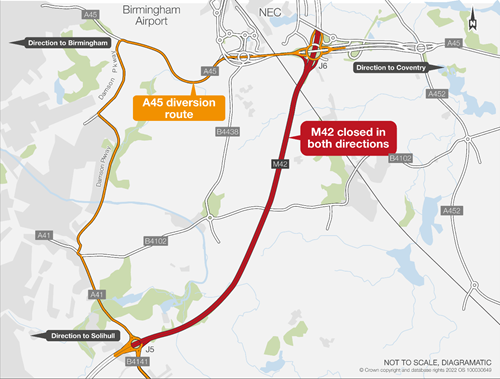
We apologise in advance for any inconvenience you may experience during the upcoming roadworks. The whole team will make every effort to manage noise levels carefully and minimise disruption to the local area.
How can we find out more?
If you’d like more information about this upgrade scheme you can contact us by:
- emailing M42Junction6@nationalhighways.co.uk
- calling 0300 123 5000 (this line is available 24 hours a day)
For the latest information about our scheme and upcoming roadworks you can also follow us on X (formerly Twitter) at @HighwaysWMIDS and find us on Facebook (National Highways: West Midlands).
-
12 February 2024
Scheme update
As part of our programme of safety and capacity improvements at junction 6 of the M42, we will be constructing a new link road to East Way, and a free-flow link from the M42 southbound to the eastbound A45, highlighted in pink in the diagram below.
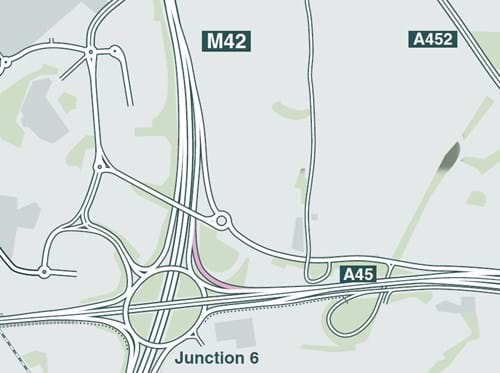
The new free-flow link road will increase capacity for traffic joining the A45 eastbound, reducing congestion at the junction.
To enable these upgrades at the junction to take place safely, we will implement narrow lanes on the A45 eastbound filter road from the M42 at junction 6.
Narrow lanes will remain in place until winter 2024 as part of our ongoing improvement works.
To ensure the safety of road users and our staff, the A45 eastbound carriageway will be closed overnight, between 9pm and 5am, from Clock Interchange to Stonebridge Island over three separate nights:
• Thursday 15 February 2024
• Monday 19 February 2024
• Thursday 29 February 2024 (10pm to 5am)During these closures, the A45 westbound carriageway will be reduced to two lanes but will remain open.
Additionally, we'll take the opportunity to install a new gantry on the A45 eastbound carriageway.
Please follow signed diversion routes during the overnight closures. We recommend planning ahead and allowing additional time for your journeys.
Gantry installation
We will also be installing two gantries over the M42 near junction 6 with improved signage to boost driver safety.
The installation of the two signs requires an overnight closures of the M42 northbound carriageway:
• M42 northbound junctions 5 to 6 closed Friday 16 February from 10pm to 5am
Due to inclement weather, the previously scheduled closure of the M42 northbound and southbound carriageways junctions 5 to 6 overnight on Saturday 17 February will no longer go ahead.Clock Interchange improvements
As part of our improvements to Clock Interchange roundabout, we will be moving the existing concrete barrier over the coming four weeks. This will require weekday overnight closures, from 9pm to 5am, of either the eastern or western half of the roundabout between 12 February and 6 March 2024.
Moving the barriers will enable us to upgrade street lighting, install traffic signs, and resurface the roundabout.Upcoming closure dates
12/02
13/02
14/02
15/02
16/02
17/02
18/02
East half of Clock Interchange
West half of Clock Interchange
A45 Eastbound
M42 NB J 5 - 6
19/02
20/02
21/02
22/02
23/02
24/02
25/02
A45 Eastbound
West half of Clock Interchange
West half of Clock Interchange
West half of Clock Interchange
East half of Clock Interchange
26/02
27/02
28/02
29/02
01/03
02/03
03/03
East half of Clock Interchange
East half of Clock Interchange
East half of Clock Interchange
West half of Clock Interchange
A45 eastboundWest half of Clock Interchange
04/03
05/03
06/03
07/03
08/03
09/03
10/03
East half of Clock Interchange
East half of Clock Interchange
West half of Clock Interchange
Signed diversion routes will always be in place when overnight closures take place.
Closure dates are subject to change due to unforeseen circumstances or inclement weather.
Access to Catherine de Barnes Lane and the airport link road will remain unaffected.
We apologise for any inconvenience our work may cause and advise drivers to plan their routes in advance, allowing extra time for travel. -
11 January 2024
An update on our programme of work along Catherine de Barnes Lane
This year we’ll move into the next stages of our improvement work along Catherine de Barnes Lane, realigning the existing road on to new roundabouts and bridges that will connect to the new link road. As we continue to work on different sections of the carriageway, Catherine de Barnes Lane will remain closed to through traffic. We’ll be working with local residents and businesses to ensure access is maintained throughout.
Work will be carried out in three phases, as shown on the map below:
Phase 4
Reconstruction and realignment of Catherine de Barnes Lane onto the new Barber’s Coppice roundabout.
Phase 5
Reconstruction and realignment of Catherine de Barnes Lane onto the new Bickenhill roundabout.
Work on phase 4 and 5 will begin on 26 January and is expected to be complete in summer 2024. We’ll then begin work on phase 6, near Clock Interchange.
Phase 6
Connecting the new A4545 link road to Clock Interchange roundabout.
Since opening Solihull Road in June 2023, our work along Catherine de Barnes Lane has been carried out in sequential phases. Phases 1, 2 and 3 have been carried out successfully however we now need to re-sequence our next phases of work due to the following reasons:
- We recently received a request from Solihull Metropolitan Borough Council (SMBC) to incorporate provision for future street lighting at the newly-built Barbour’s Coppice roundabout at the southern end of the road, at the location of phase 4.
- Utility diversions, which are being carried out as part of phase 3 works, are still to be completed due to being dependant on the availability of third party providers.
Due to the increased scope of work, and to reduce any potential elongation of phase 4, we’ll now be carrying out phases 4 and 5 simultaneously. This adjustment will allow us optimise resources and seamlessly integrate the new road lighting enhancements with our original planned work. It also means we’re still able to follow our overall project timeline and our commitment to upgrading Catherine de Barnes Lane within the timescales previously communicated.
We’ll continue to use Damson Parkway as our approved diversion route. For local residents and businesses, we’ll put in place clearly signed diversion routes which have been agreed with SMBC as the most suitable route for both the amount and type of traffic being diverted.
We a
 pologise in advance for any disruption you may experience and we’ll make every effort to ensure the impact on the local community and motorists is kept to a minimum.
pologise in advance for any disruption you may experience and we’ll make every effort to ensure the impact on the local community and motorists is kept to a minimum. We always aim to work to the programme, however these closures may be amended due to poor weather or operational reasons
-
20 November 2023
An update on our programme of work into December
Work on our M42 junction 6 upgrade is continuing and over the coming weeks and months as winter approaches, we’ll be carrying out work at a number of locations across the site.
Junction 6 southbound slip road
We’ve extended a drainage channel underneath the motorway M42 to allow us to carry out improvements to the junction 6 southbound exit slip road which runs over the top of it. A partial lane 1 restriction has been in place along the length of the exit slip road since July 2023 and now this extension work is complete, we’re ready to remove temporary barriers that are in place.
Due to the size of the machinery needed to complete the barrier removal, we’ll be closing the M42 junction 6 southbound exit slip road overnight on 24 November, from 10pm to 5am to ensure the safety of our workforce and to protect motorists.
East Way link road
As well as the new slip road, our junction improvements also include a new roundabout, shown in blue below, which will connect to East Way.
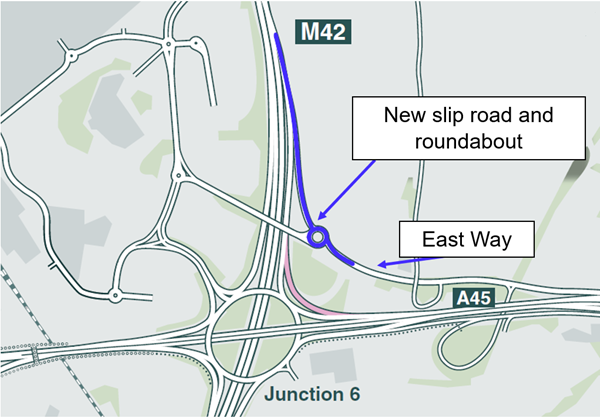
To allow us to realign the new roundabout to East Way, we need to temporarily close the existing link to East Way from the junction 6 slip road (shown in red below) for up to six weeks, from Monday 27 November 2023.
Diversion routes will be in place for traffic intending to travel to and from the NEC, as shown in green below. For the safest and quickest journey, always follow our clearly sign posted routes, rather than your sat navs
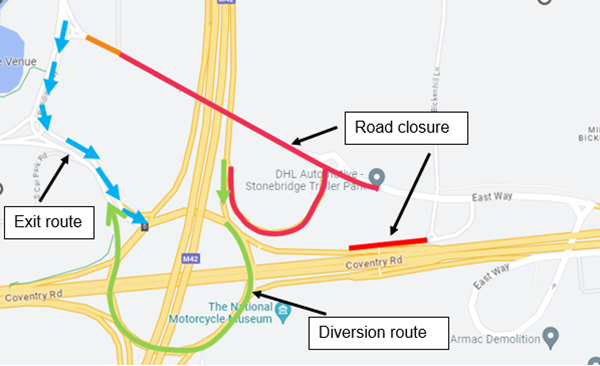
To help keep disruption to a minimum, our traffic management plan has been designed to ensure that the junction 6 southbound exit remains open for the duration of this work. This means that southbound traffic will still be able to exit the M42 at junction 6 as normal, so you’ll still be able to get to where you need to.
Catherine de Barnes Lane
Our work along the road will soon move from phase 3 to phase 4 where we’ll be realigning the southern end of Catherine de Barnes Lane on to the new Barber’s Coppice roundabout.
** UPDATE **
We’d initially planned to re-open Shadowbrook Lane in December 2023, however we've had to change our programme of work and we'll now be reopening the road in January 2024.
We’ll continue working with local residents and businesses to ensure access is maintained throughout closures.
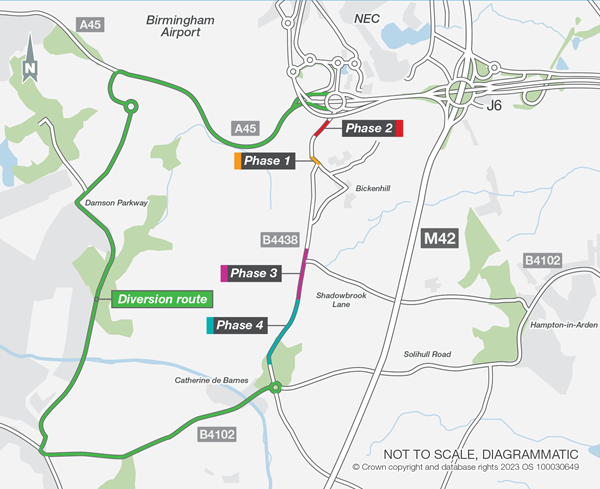
Narrow lanes will remain in place on the M42 until February 2024 to allow our teams to safely continue work on the construction of the new M42 junction 5a.
We apologise in advance for any inconvenience you may experience during the upcoming roadworks. The whole team will make every effort to manage noise levels carefully and minimise disruption to the local area.
How can we find out more?
If you’d like more information about this upgrade scheme you can contact us by:
- emailing M42Junction6@nationalhighways.co.uk
- calling 0300 123 5000 (this line is available 24 hours a day)
For the latest information about our scheme and upcoming roadworks you can also follow us on Twitter (@HighwaysWMIDS) and find us on Facebook (National Highways: West Midlands).
-
20 October 2023
HS2 work - A45 East Way loop, Bickenhill
We’ve been upgrading Middle Bickenhill Lane into a two-way road with East Way as part of our work on the M42 junction 6 scheme. This section of our work is almost complete, and we’re working collaboratively with HS2 who are delivering a high-speed railway which will pass under the A45 as it approaches the new interchange station. This requires significant work to the A45 and the adjoining road, East Way.
So, they can complete this work, several utilities need to be moved and diverted to make sure that the work doesn’t have an impact on the supply. To help facilitate this, we’ll be temporarily leaving the area and re-opening the A45 slip road to all traffic (highlighted in red in the image below) to allow HS2 to operate safely until the end of November.
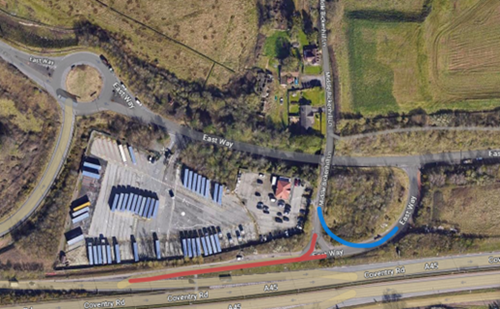
HS2’s utility diversion work will require a full, 24/7 closure of the East Way ‘loop’ section joining the A45 westbound carriageway to the East Way. This is expected to be in place from Monday 23 October until Friday 24 November.
Please visit the HS2 National Highways webpage and see the ‘A45 East Way loop, Bickenhill - 23 October to 24 November 2023’ section for more information about this work: nationalhighways.co.uk/our-roads/west-midlands/high-speed-2-hs2-works-on-national-highways-network/.
Once the HS2 utility diversion is complete, we’ll be returning to finish our work to convert Middle Bickenhill Lane into a two-way road, and the A45 slip will be permanently closed. We’ll share more information about this remaining work on our webpage when the details have been finalised.
How can we find out more?
For more information, you can:
- email us at: M42Junction6@nationalhighways.co.uk
- call us on: 0300 123 5000
For the latest information about our scheme and upcoming roadworks you can follow us on Twitter and Facebook.
-
22 September 2023
Read our new-look newsletter!
Our latest scheme newsletter is now available. You'll be able to find out what's been happening on the project since our last update and discover more about how we’ve been helping the local otter population.
Click the image below to read it now.
-
04 July 2023
Clock Interchange roundabout and M42 J6 exit slip road closures
We’re upgrading the M42 at junction 6 to enable better movement of traffic on and off the A45, supporting access to Birmingham International airport and train station as well as preparing capacity for the new HS2 station. Our work includes creating a new junction on the M42 and building a dual carriageway between this new junction and Clock Interchange.
Clock Interchange closure
We’re carrying out improvements to the Clock Interchange roundabout. As our work progresses across different areas of the junction, we need to close the roundabout overnight to allow our teams to safely move concrete barriers, providing a safe working area and enabling our work to continue.
The following closures (shown in red on the maps below) will be in place between 10pm and 5am. Diversion routes are shown in blue:
- Monday 10 & Tuesday 11 July - A45 eastbound exit slip road closed.
Diversion route is to continue along the A45 to the junction 6 roundabout, returning on the A45 westbound to Clock Interchange roundabout
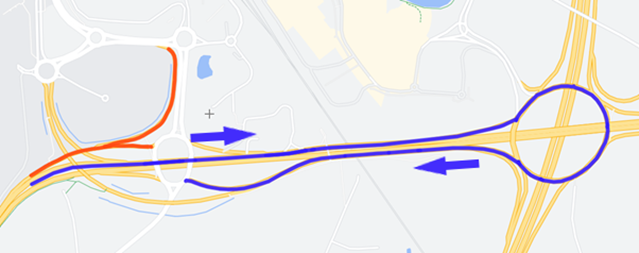
- Wednesday 12 & Thursday 13 July - A45 westbound exit slip road closed.
Diversion route is the airport link road
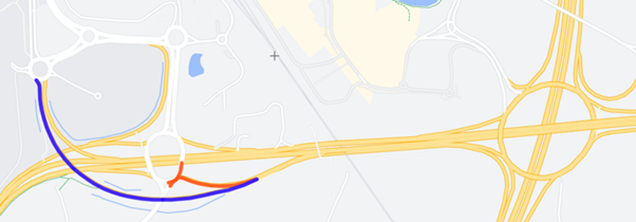
Traffic management will be removed during the daytime and a clearly signed diversion route will be in place for affected traffic.
Why are we doing this?
The night-time closures will allow our teams to safely move existing concrete barriers in place around the roundabout from one area to another, allowing our teams to work on areas of the outer ring of the roundabout. Once the new traffic management is in place, our work will include:
- earthworks
- installing new drainage
- renewal of street lighting and traffic signals
- bridge deck waterproofing
- installation of kerbing
- resurfacing work
M42 junction 6 exit slip road closure
We need to extend an existing culvert that allows water to run underneath the M42. It'll enable us to carry out improvements to the junction 6 southbound exit slip road which will run over the top of it.
To allow us to complete this work safely, lane 1 of the M42 southbound junction 6 exit slip road will be closed between 9am and 4pm, Monday to Friday, from Monday 12 June. Traffic management will be removed outside of these hours at peak times.
There will also be an overnight closure of the exit slip road to allow us to safely install temporary barriers between 10pm to 5am on Tuesday 11 July.
Once the barriers are in place, a partial lane 1 restriction along the length of the M42 junction 6 southbound exit slip road will be in place for up to 3 months while we complete our work.
What should motorists do?
When the roads are closed, we’ll put in place clearly signed diversion routes which have been agreed with Solihull Metropolitan Borough Council as the most suitable routes for both the amount and type of traffic being diverted.
We apologise in advance for any inconvenience you may experience during the upcoming roadworks. The whole team will make every effort to manage noise levels carefully and minimise disruption to the local area.
How can we find out more?
If you’d like more information about this upgrade scheme you can contact us by:
- emailing M42Junction6@nationalhighways.co.uk
- calling 0300 123 5000 (this line is available 24 hours a day)
For the latest information about our scheme and upcoming roadworks you can follow us on Twitter (@HighwaysWMIDS) and find us on Facebook (National Highways: West Midlands).
- Monday 10 & Tuesday 11 July - A45 eastbound exit slip road closed.
-
05 June 2023
Please check before you travel: upcoming work on Catherine de Barnes Lane
Work is progressing well on our upgrade to junction 6 of the M42. As part of the scheme we’re creating a new motorway junction (5a) and dual carriageway link road (A4545) between the new junction and Clock Interchange.
In May we successfully demolished the existing Solihull Road bridge. Now this work has been completed, we are currently on schedule to open the new Solihull Road bridge on 24 June 2023.
Once open, our next phase of work will begin on Catherine de Barnes Lane. This involves realigning the existing road on to new roundabouts and bridges that will connect to the new link road. As we’ll be working on different sections of the carriageway, Catherine de Barnes Lane will be closed to through traffic from June 2023 until spring 2024. We’ll be working with local residents and businesses to ensure access is maintained throughout.
Work will be carried out in four phases, as shown in the map below:
Phase 1 - Saturday 24 to Sunday 25 June 2023
Installation of two expansion joints that connect the bridge to the road.
Phase 2 - Monday 26 June to Sunday 16 July 2023
Access improvements and installation of drainage that runs underneath the road.
Phase 3 - Monday 17 July until winter 2023
Reconstruction and realignment of Catherine de Barnes Lane onto a new bridge, south of Shadowbrook Lane.
Phase 4 - winter 2023 to spring 2024
Reconstruction and realignment of Catherine de Barnes Lane onto the new Barber’s Coppice roundabout.
We'll also be closing the western side of Clock Interchange roundabout from 10pm on Friday 23 June to 5am on Saturday 24 June (shown in red below). Our teams will be carrying out work on the roundabout and the A45 entry slip road which will reopen on Saturday 24 June. Access to Birmingham Airport from the A45 will remain unaffected and closures will be clearly signed on the westbound A45 approach and from Catherine de Barnes Lane.
When the roads are closed, clearly signed diversion routes will be in place. We’ll maintain pedestrian access along Catherine de Barnes Lane where possible however some temporary closures may be required while we complete our work.
We apologise in advance for any disruption you may experience and we’ll make every effort to ensure the impact on the local community and motorists is kept to a minimum. Access to homes, frontages and emergency services vehicles will be maintained throughout the work.
We always aim to work to the programme, however these closures may be amended due to poor weather or operational reasons
-
09 May 2023
Watch how a bridge spanning the M42 was demolished
This new time-lapse footage shows how specialist equipment was used to demolish the existing Solihull Road bridge which spanned the M42.
The M42 was closed in both directions between junctions 5 and 6 from 10pm on Friday 5 May 2023 and was re-opened some 22 hours earlier than planned with closures removed from 7am onwards on the morning of Sunday 7 May.
The demolition of this bridge marks a key milestone for the project. It means work can continue on the construction of the new junction 5a slip roads, part of our £282m investment to upgrade M42 junction 6 which also includes building a new 2.4km dual carriageway link road between this new junction and Clock Interchange. Once complete it will alleviate congestion for motorists, make journeys safer, and support economic growth in the region.
If you’d like more information about the M42 junction 6 upgrade scheme you can contact us by:
-
emailing M42Junction6@highwaysengland.co.uk
-
calling 0300 123 5000 (this line is available 24 hours a day)
-
-
24 October 2022
M42 junction 6 upgrade stakeholder update
As part of the M42 Junction 6 Improvement scheme, we're planning to build a free flow link between the A45 eastbound and the M42 northbound. This link road would pass under the East Way bridge before joining the M42.
As part of our robust inspection regime at East Way Bridge, we identified some issues with the bridge bearings underneath the structure. While we assess the type of solution that is needed, we've taken the precautionary measure of putting some supports underneath the bridge to resolve the issue temporarily. Scaffolding access remains in place to facilitate regular inspections and monitoring.
The bridge is safe and remains open to traffic, however while assessments take place for the permanent solution at this bridge, we've decided to postpone our work on the new free flow link.
We understand this is disappointing, but safety is our top priority and we do not wish to compromise the ongoing assessment and monitoring work at East Way bridge by carrying out intrusive ground works near its foundations.
We're committed to building the new free flow link road in the future and we'll plan to complete this as a separate project alongside the permanent solution at East Way bridge. Our aim is to keep disruption to a minimum and limit the amount of roadworks in the area at any one time. We'll provide more information on when this work will be carried out as soon as it’s available.
-
18 October 2022
Watch how two bridges were lifted into position over the M42
Click the image below to view new timelapse footage which shows the moment two bridges, weighing a total of 2,050 tonnes, were moved into place over the M42 in Solihull.
Specialist teams carried out the work last weekend, which took over 40 hours to complete.
The installation of these bridges marks a key milestone for the M42 Junction 6 project team who are delivering a £282m upgrade of the motorway in Solihull, which will support economic growth and planned development in the region.
If you’d like more information about the M42 Junction 6 scheme you can:
- email us at: M42Junction6@nationalhighways.co.uk
- call us on: 0300 123 5000
For the latest information about our scheme and upcoming roadworks you can follow us on Twitter (@HighwaysWMIDS) and find us on Facebook (National Highways: West Midlands).
-
05 May 2022
Watch how a 92-tonne footbridge was lifted into position over the A45
This new time-lapse footage shows the moment a footbridge for pedestrians and cyclists was installed across the A45 in Solihull.
The 92-tonne bridge was lowered in to place by a team of 30 technical specialists and engineers who carried out the work on the evening of Saturday 30 April.
It was installed as part of our £282m investment to upgrade M42 junction 6 which also includes building
- a new 2.4km dual carriageway link road, aligned to the west of Bickenhill
- a new junction (5a) on the M42 motorway, approximately 1.8km south of the existing M42 Junction 6 (Solihull)
- two new roundabouts north of the B4102 Solihull Road on either side of the M42 motorway
Once complete it will alleviate congestion for motorists, make journeys safer, and support economic growth in the region.
If you’d like more information about the M42 junction 6 upgrade scheme you can contact us by:
- emailing M42Junction6@highwaysengland.co.uk
- calling 0300 123 5000 (this line is available 24 hours a day)
Project information
Visit our M42 junction 6 feedback tool to have your say. The tool includes an interactive map. You can click on a location to make a specific comment, or give us your general feedback.
ECHO is a one-way feedback tool, so if you’d like a response to your feedback you can email the project team at: M42Junction6@nationalhighways.co.uk
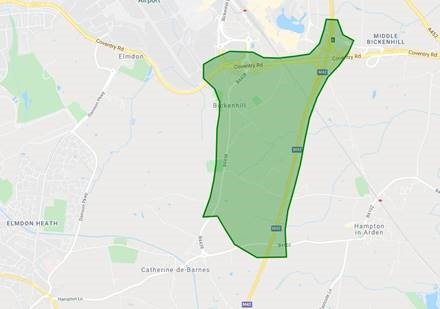
Traffic congestion and poor journey reliability have constrained investment and economic growth around the M42 at junction 6. Having almost reached capacity, the junction has become a bottleneck, causing delays across the network.
We know the junction doesn’t have sufficient capacity to accommodate forecast traffic growth beyond 2019, even without the new HS2 station, so we’re building:
- a new 2.4km dual carriageway link road, aligned to the west of Bickenhill
- a new junction (5a) on the M42 motorway, approximately 1.8km south of the existing M42 Junction 6 (Solihull)
- two new roundabouts north of the B4102 Solihull Road on either side of the M42 motorway
- a new overbridge above the A45 near to the Arden Hotel, providing cyclists and walkers with a safer route to cross the A45
Once complete motorists will benefit from smoother journeys and the work will support economic growth.
The objectives of the scheme are to:
- ensure the safe and reliable operation of the road network
- increase the capacity at junction 6, reducing congestion
- improve access to key businesses and locations such as Birmingham Airport and support economic growth in the area
- improve access for cyclists, walkers and other vulnerable users of the network
Documents
The DCO process was established by the Planning Act 2008 and is used for certain large and complex schemes (including highway improvements) that have been designated as a Nationally Significant Infrastructure Project (NSIP) by the Government.
The benefits of the DCO process include extensive pre-application consultation, detailed analysis, including a full Environmental Impact Assessment, and examination by an independent inspector before the final decision is made.
The Secretary of State for Transport granted development consent for the M42 junction 6 Development Consent Order (DCO) on 21 May 2020.
Development Consent Order – Requirements Register
Requirements are conditions that have been included in the DCO, which control how the project must be implemented (constructed and maintained). Implementing the DCO in accordance with these conditions involves completing consultation and approval processes that have been defined in the DCO. These processes are referred to here and in the DCO as “discharging” the requirements.
This Requirements Register is a live document and will be updated as the process to discharge the requirements progresses.
The latest version will always be published on this page.
M42 junction 6 improvements - Development Consent Order (DCO) requirements register
This register will be maintained for three years following completion of the project. The register sets out:
- each requirement
- whether the requirement needs approval by the Secretary of State (or other duty holder)
- whether any approval has been applied for or given
General Vesting Declaration 10
General Vesting Declaration 11
General Vesting Declaration 12
General Vesting Declaration 13
General Vesting Declaration 14
General Vesting Declaration 15
General Vesting Declaration 16
General Vesting Declaration 17
General Vesting Declaration 18
General Vesting Declaration 19
General Vesting Declaration 20
General Vesting Declaration 21
General Vesting Declaration 22
General Vesting Declaration 23
General Vesting Declaration 24
A guide to the planning process
Consultation brochure
Option 1 example corridor of impact
Option 2 example corridor of impact
Option 3 example corridor of impact
Example cross sections
Preferred Route Announcement leaflet
Preferred Route Announcement diagram
Report on Public Consultation
Technical Appraisal Report
Scheme Assessment Report
Traffic information
Information about scheduled roadworks and events on our motorways and major roads.X
Manage your cookie preferences to view the content on this page
Sign up for updates!
Keep up to date with what's happening on this scheme by signing up to our updates.
